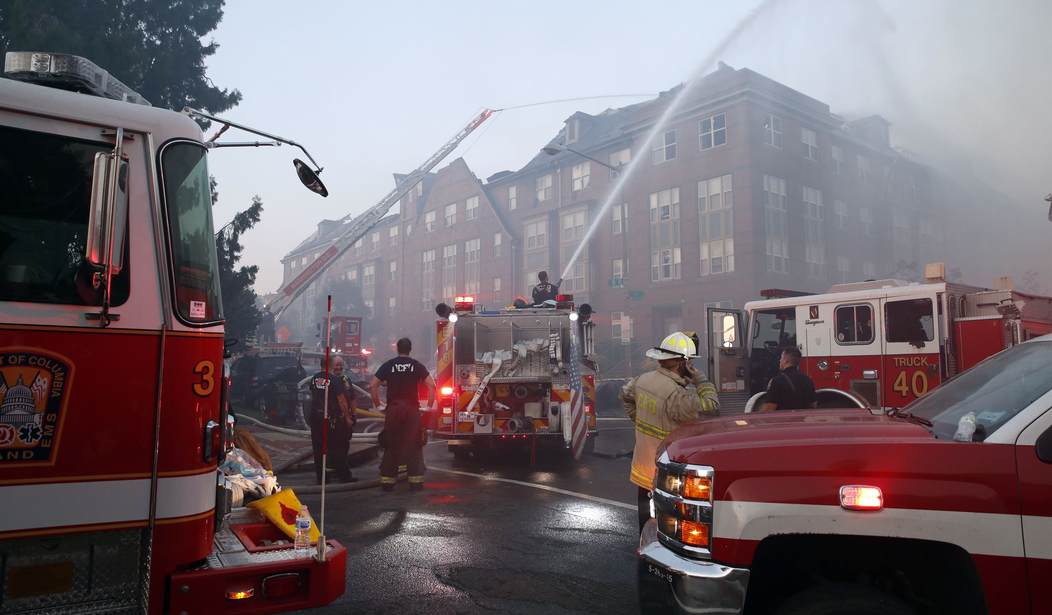Historically, firefighting has been more about cashing in than saving lives. In Ancient Rome, one entrepreneur would rush to a burning building with his fire brigade and offer to buy the property for a song, or let it burn if the owner said no.
And things may not have changed much.
Preposterous, unsustainable pension funds for firefighters and other public departments are breaking the bank across the country. Combined, states have $4.2 trillion in pension liabilities, and the average state can only pay for two thirds of pensions it owes. This pension crisis is only growing, particularly in California, Illinois and New Jersey. At the end of 2019, Illinois’s five pension systems combined held nearly $139 billion of debt. However, their state worker contributions often only cover about 4 to 6 percent of lifetime benefit payouts, ultimately heavily relying on taxpayer contributions. While in New Jersey, the state is making an effort to balance its historically underfunded pension checkbook by borrowing $4.5 billion in the middle of a global pandemic. One would think that money would be better used elsewhere as small businesses and American families struggle to get by.
If budgets are too strapped, local agencies slash or just drop critical programs. Because that is clearly not a popular move, in an effort to stay one step ahead, some city fire departments are trying to bring emergency services performed by contractors “in-house” to generate more revenue – particularly ambulance and medical services. Simply put, under the claim of streamlining budgets, city officials just keep gaming the system.
The problem didn’t just happen, and it didn’t happen because firefighters and their dalmatians are constantly rushing to put out blazes. Indeed, fire departments do a lot less firefighting than they used to. For decades, both politicians and public-sector union kingpins have used pensions as bargaining chips, making absurd promises to capture valuable endorsements. Unsurprisingly, this practice is especially gaining popularity in the Golden State, though its ramifications are not so golden.
Recommended
The California Public Employees’ Retirement System is a disaster that hasn’t been able to balance its books since 2007, has unfunded liabilities at $150 billion, and will soon demand cities to double their payments.
And this is best-case scenario. The success of a pension fund depends on the markets, so no one is going to enjoy the retirement they were promised between the financial bloodbath of just the first few months of the Biden administration and the trend of “sustainable” investing, which exchanges terrible returns for virtue signaling.
So, to try to put out the fire, California governments are finding workarounds, which involve ripping off the taxpayer in increasingly creative ways.
The most high-profile workaround is the innocently named “cost recovery,” wherein citizens in distress get stuck with a surprise bill for hundreds of dollars as a first-responder fee – a fee for service for which their taxes have already paid. This creates a perverse incentive for firefighters to respond unnecessarily to maximize revenue. The LA Fire Department responds to as many as 1,000 emergency medical calls per day that only requires the assistance of healthcare workers.
The poster child for all of this mismanagement is the city of Vallejo, CA, whose pensions have long been among the most generous in the state – so generous in fact they drove the city to bankruptcy. The city’s experiment with first-responder fees was so disastrous it was eventually canceled.
Despite this, one former fighter has explained how city councils can sneak cost recovery past the taxpayers in an editorial so garish it would make the military industrial complex blush.
There is no silver bullet to a problem that has developed over time, with so many people making money and prolonging the problem rather than finding a solution. Long term, leaders need to stick to reasonable budgets, especially as our nation works to recover from the economic hardships of COVID-19. In the short term, local governments need to eschew both “cost recovery” and cutting off contractors who offer more efficient solutions – going forward with either of these measures is like, pardon the expression, throwing gasoline on a fire.
Jared Whitley is a longtime DC politico, having worked in the US Senate, White House, and defense industry. He has an MBA from Hult International Business School.

























Join the conversation as a VIP Member